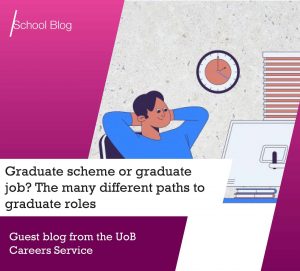Graduate scheme or graduate job? The many different paths to graduate roles
Graduate schemes
Graduate schemes or programmes typically last between one and two years and offer training in a formal and structured environment, often with big-name companies. You’ll need to have a degree by the time you begin the training. Lots of people start applying for graduate schemes in their final year of uni, but you might not realise that some schemes don’t promise a job at the end of the training period. Plus, if you’re applying now as a graduate, the scheme won’t start until next year – which might not fit into your plan.
Graduate jobs
Graduate jobs still provide training and support, but are less structured than schemes. You still need a degree to apply for these roles, but they offer a lot more freedom, including loads of different job roles.
Is a graduate scheme for you?
Graduate schemes can come with high starting salaries, structured training opportunities, and the chance of employment in a big-name organisation. But applying only to schemes means you might miss out on the varied opportunities available to you at different companies, like small to medium enterprises (SMEs). Depending on the industry you’re interested in, you might find more opportunities for progression by starting with an internship, which will also help you build a network and scout out opportunities internally.
Top tips on securing a graduate job
Firstly, research! You can find out which sectors are hiring by understanding labour market information (LMI). Keeping up with the developments in your chosen sector can make you feel informed when talking to employers, as well as helping you narrow down your focus. Check out our LMI guide and industry guides for insights into current trends.
There are many paths you can take to kickstart your graduate career:
- Internships – some sectors, like media, are really competitive or simply don’t offer grad schemes. Instead, internships can give you a way in, to gain relevant experience and build up a network. Check out our guide on finding work experience and internships.
- Working for an SME or startup – working in a small-to-medium enterprise means you could be working with really small teams, which means you can be flexible and really make an impact on the company. Hard work will pay off – you can progress more quickly and take on more responsibility in a small business than in a graduate scheme. Take a look at our SME internship guide.
- Graduate work experience – put your networking cap on! If you want to get experience in a sector without committing years of your life to a graduate scheme, you can get in touch with organisations that interest you to reach out with a speculative enquiry – read our guide to making speculative applications. Gaining some short-term work experience will give you a taste of the role and an opportunity to develop skills and industry knowledge. Here’s how to sell your skills from work experience.
[“source=schoolofeducation”]



